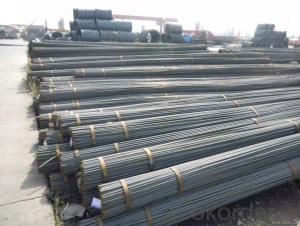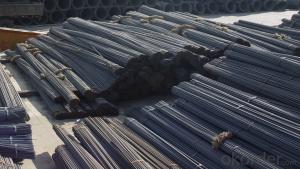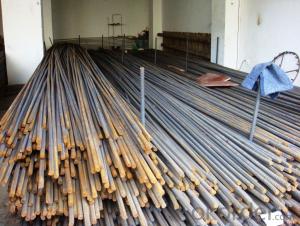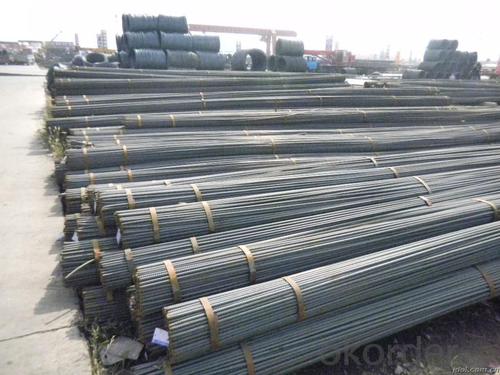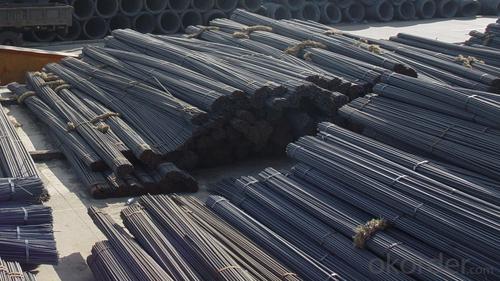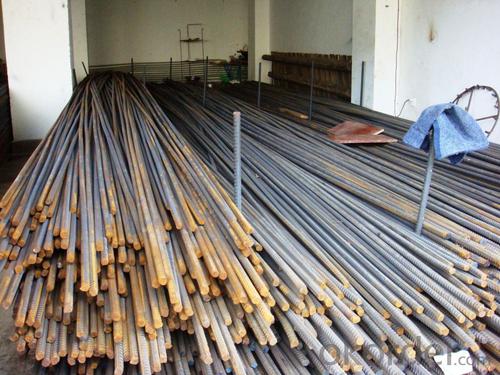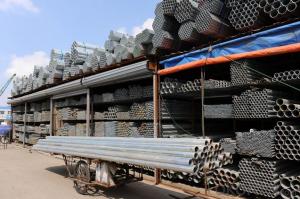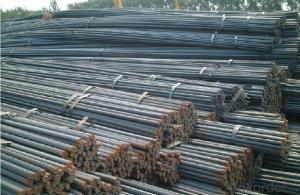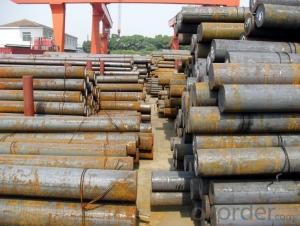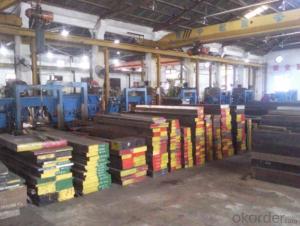Steels Manufacture Building Material Made in China
- Loading Port:
- Tianjin
- Payment Terms:
- TT OR LC
- Min Order Qty:
- 100 m.t
- Supply Capability:
- 1000 m.t/month
OKorder Service Pledge
OKorder Financial Service
You Might Also Like
1.Packaging & Delivery
Packaging Detail: | in bundles or as customer's requirement |
Delivery Detail: | Within 30days after receiving your deposit or copy of L/C |
2.Specifications
HRB400,HRB500 Steel Rebars
1.China direct supplier
2.Best service
3.Competitive price
4.Quantity assured
3.Product Description
Name | High Tensile Export Reinforcing Steel Bar ,Deformed Steel Bar ,HRB400B,HRB,46B,HRB500 Building Construction Material |
Standard | ASTM A615 /BS BS 4449 /GB HRB/ JIS G3112 |
Grade | A615 Gr40/60/75 BS 4449 Gr460,B500 GB HRB335,HRB400 ,HRB500
JIS G3112 SD390
|
Diameter | 6mm-40mm |
Length | 6-12m |
Technique | Low temperature hot-rolling reinforcing deformed steel rebar |
Tolerance | As the standard or as your requirement |
Application | Building, construction, road, bridge,etc |
Certificated | BV |
MOQ | 500tons per size steel rebar |
Packing details | Steel rebar packed in bundle or as your requirement |
Delivery | Within 30 days after deposit |
Payment | T/T or L/C |
4.Chemical Composition
Grade | Technical data of the original chemical composition (%) | |||||||
C | Mn | Si | S | P | V | |||
HRB400 | ≤0.25 | ≤1.60 | ≤0.80 | ≤0.045 | ≤0.045 | 0.04-0.12 | ||
Physics capability | ||||||||
Yield Strength(N/cm2) | Tensile Strength(N/cm2) | Elongation (%)
| ||||||
≥400 | ≥470 | ≥14 | ||||||
Grade | Technical data of the original chemical composition (%) | |||||||
C | Mn | Si | S | P | V | |||
HRB500 | ≤0.25 | ≤1.60 | ≤0.80 | ≤0.045 | ≤0.045 | 0.04-0.12 | ||
Physics capability | ||||||||
≥500 | ≥630 | ≥12 | ||||||
5. Theorectical weight
Diameter (MM) | Cross Sectional Area (MM2) | Theorectical Weight (KG/M) | Weight of 12M Bar (KG) | A Ton Contains 12M Bars (PCS) |
6 | 28.27 | 0.222 | 2.664 | 375.38 |
8 | 50.27 | 0.395 | 4.74 | 210.97 |
10 | 78.54 | 0.617 | 7.404 | 135.06 |
12 | 113.1 | 0.888 | 10.656 | 93.84 |
14 | 153.9 | 1.21 | 14.52 | 68.87 |
16 | 201.1 | 1.58 | 18.96 | 52.74 |
18 | 254.5 | 2 | 24 | 41.67 |
20 | 314.2 | 2.47 | 29.64 | 33.74 |
22 | 380.1 | 2.98 | 35.76 | 27.96 |
25 | 490.9 | 3.85 | 46.2 | 21.65 |
28 | 615.8 | 4.83 | 57.96 | 17.25 |
32 | 804.2 | 6.31 | 75.72 | 13.21 |
36 | 1018 | 7.99 | 98.88 | 10.43 |
40 | 1257 | 9.87 | 118.44 | 8.44 |
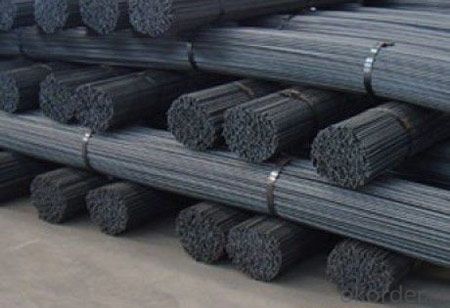
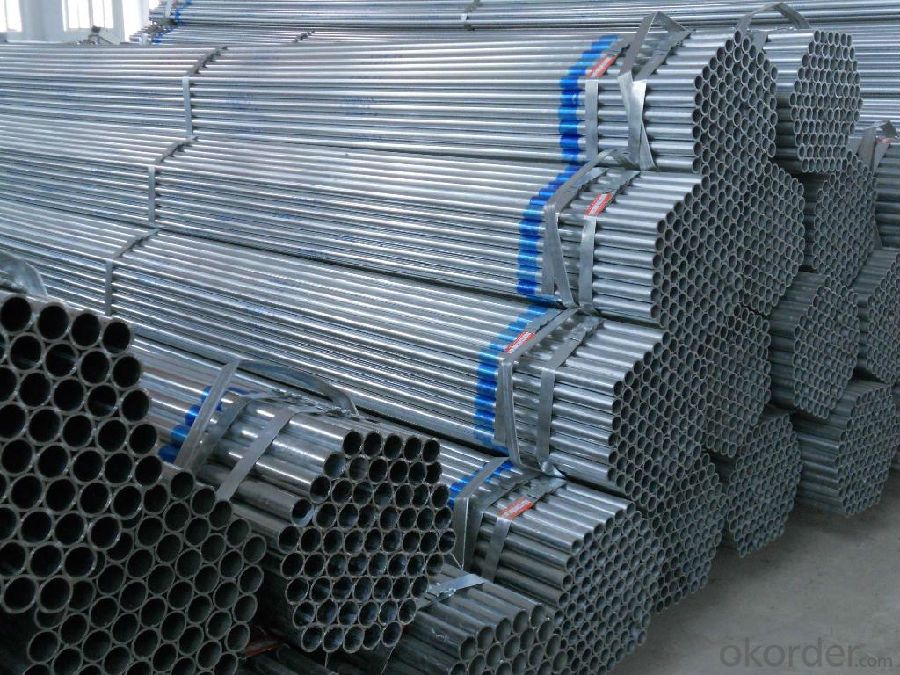
- Q: Can steel pipes be used for the construction of offshore platforms?
- Yes, steel pipes can be used for the construction of offshore platforms. Steel pipes are commonly used in offshore construction due to their high strength, durability, and resistance to corrosion in harsh marine environments. They are suitable for various applications, including the fabrication of jacket legs, risers, pile sleeves, and other structural components necessary for offshore platform construction.
- Q: Are the welded and galvanized tubes the same weight?
- The same specifications of welded pipe and galvanized pipe weight is not the same, the general welding tube weight, galvanized pipe light.
- Q: Can steel pipes be used for irrigation systems?
- Yes, steel pipes can be used for irrigation systems. They are commonly used due to their durability, strength, and resistance to corrosion. Steel pipes can handle high water pressure and are suitable for both above-ground and underground installations in irrigation systems.
- Q: Can steel pipes be used for oil refinery applications?
- Yes, steel pipes can be used for oil refinery applications. Steel pipes offer many advantages for oil refinery applications including high strength, durability, and resistance to corrosion. They are able to withstand high pressure and temperature conditions that are common in oil refinery operations. Steel pipes are also easy to transport and install, making them a popular choice for oil refinery projects. Additionally, steel pipes can be customized to meet specific requirements such as size, thickness, and coating, making them suitable for a wide range of oil refinery applications.
- Q: Can steel pipes be used for underground fuel storage tanks?
- Yes, steel pipes can be used for underground fuel storage tanks. Steel pipes are commonly used for various applications, including underground storage tanks for fuel. They are strong, durable, and resistant to corrosion, making them suitable for long-term storage of fuels such as gasoline, diesel, and oil. Additionally, steel pipes can be easily welded together to create a seamless and secure tank structure. However, it is important to ensure that the steel pipes used for underground fuel storage tanks are properly coated with corrosion-resistant materials to protect them from any potential damage caused by exposure to moisture or the chemicals present in the fuel. Regular inspection and maintenance are also necessary to ensure the integrity of the tank and prevent any leaks or environmental hazards.
- Q: What is the outer diameter of the steel tube?
- The outer diameter refers to the maximum diameter including the thickness of the steel tube, the inner diameter is the length of the hollow part inside, and the outer diameter minus the inside diameter is the thickness of the steel pipe
- Q: What is the role of steel pipes in the renewable energy sector?
- Steel pipes play a crucial role in the renewable energy sector as they are commonly used for transporting various fluids, including water, steam, and gases, in renewable energy systems. They are extensively utilized in the construction of wind turbines, solar power plants, and geothermal installations. Steel pipes are employed for the transportation of water in hydroelectric power plants and for the transmission of heat in concentrated solar power systems. Additionally, they are instrumental in the distribution and storage of fuels such as hydrogen and biogas, which are vital components of renewable energy technologies. Overall, steel pipes provide a reliable and durable means of transporting resources and energy within the renewable energy sector.
- Q: Can steel pipes be used for sewage systems?
- Yes, steel pipes can be used for sewage systems. Steel pipes are commonly used in sewage systems due to their durability, strength, and resistance to corrosion. They are particularly suitable for high-pressure applications and can withstand the harsh conditions often found in sewage systems. Additionally, steel pipes are relatively easy to install and maintain, making them a popular choice for sewage infrastructure projects.
- Q: Can steel pipes be used for geothermal systems?
- Yes, steel pipes can be used for geothermal systems. Steel is a commonly used material for geothermal applications due to its durability, strength, and resistance to corrosion. It can effectively withstand the high temperatures and pressures associated with geothermal systems, making it a suitable choice for transporting the geothermal fluid to and from the heat source.
- Q: How are steel pipes joined together?
- Steel pipes are often joined together using different methods such as welding, threading, and couplings. Welding involves melting the pipe ends and fusing them together, creating a strong and seamless joint. Threading involves cutting threads on the pipe ends and using fittings to screw them together. Couplings are used to connect two pipes by sliding them over the ends and tightening them with bolts or screws.
Send your message to us
Steels Manufacture Building Material Made in China
- Loading Port:
- Tianjin
- Payment Terms:
- TT OR LC
- Min Order Qty:
- 100 m.t
- Supply Capability:
- 1000 m.t/month
OKorder Service Pledge
OKorder Financial Service
Similar products
Hot products
Hot Searches
Related keywords
